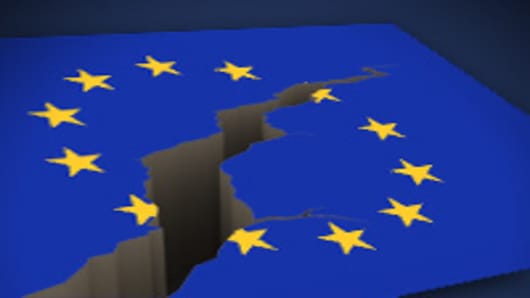As last week's euro zone rally was followed by falls across the board Monday, one strategist told CNBC that the "real problem" is yet to come.
"The real problem will be the need to finance unsecuritized senior debt, which is still quite short-term in Europe," John Ricciardi, head of investments, Kestrel Partners, told CNBC. "We have to roll this over in the next 12 months, and it's as big an amount cited as the leveraged EFSF (bailout fund)."
The euro zone's banks, seen by many as the source of the region's debt crisis, will ultimately be bailed out by "vested interests," Sean Corrigan, chief investment strategist, Diapason Commodities Management, said.
"There may be one or two forced to merge or to fall by the wayside, but all the vested interests will come back together," he said. "We don't allow for the market or competitive forces to come to their full severity, and when these guys act like bandits in the good times and come with begging bowls in the bad, we criticize capitalism."
Under new recapitalization regulations announced as part of last week's euro zone agreement, euro zone banks will have to have core capital reserves of 9 percent by the end of June 2012.
While larger banks have rushed to claim that they will not have to raise fresh capital, there are fears that the region's weaker banks, with higher exposure to sovereign debt from countries such as Greece and Italy, may struggle.
Jean-Claude Trichet, the outgoing president of the European Central Bank, said on Monday that too many European Union leaders did not understand the gravity of the Greek debt situation when it first emerged, and said that much of his time was spent convincing European politicians to act.
The euro zone deal has been criticized for not providing all the answers the markets want. After an initial rally when it was announced last Thursday, European markets fell across the board Monday morning.
"They have averted a collapse this way, but they themselves don't know what they have put in place," Corrigan said of the EU leaders. "There's this idea that it will conduct some little bit of magic, that these guys in the financial markets, who we hate, have been conducting and this will simply make Italy's debt lower and Greece competitive. Yet nobody knows what the details are."
He pointed out that the UK policy of taking stakes in banks such as Royal Bank of Scotland, without dictating bank policy, had led to resentment as banks continued paying bonuses despite being part-owned by UK taxpayers.
"Whether or not you believe the government should be setting banking policy rather than bankers, the issue is that the government didn't take any executive control," Corrigan said. "If that's going to happen, there should be a clear program of forcibly putting the bank back in the hands of the market in a set time. I don't see that happening in Britain."



